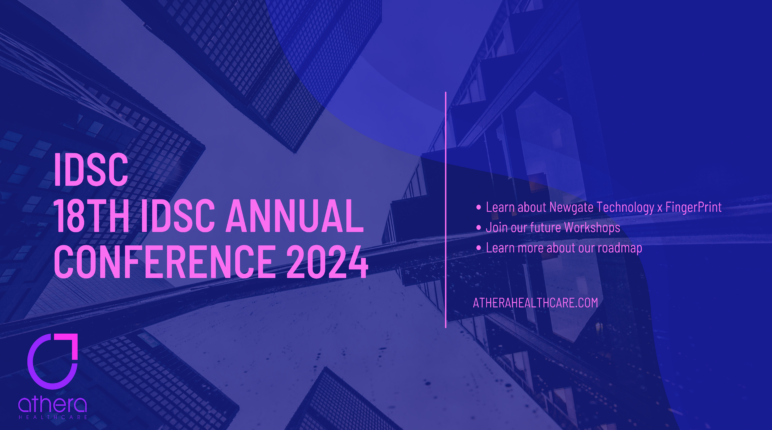Insights from the IDSc 18th Annual Conference: Driving Efficiency and Innovation in Decontamination

The 18th Annual IDSc Conference brought together leaders in decontamination and sterile services to address key industry challenges and explore how innovative solutions can push for progress in an industry limited by staid tech, tight budgets, and operational chaos.
Athera Healthcare attended the event to connect with healthcare professionals and gather insights into how we can influence our product roadmap to match common challenges faced by our peers. Here’s what we learned:
1. Efficiency is a top priority
Decontamination teams are under constant pressure to improve efficiency—whether through cost-saving measures, better capacity planning, or streamlined workflows. Across the board, the drive for operational excellence remains a central focus, with cost savings at the forefront of decision-making.
Currently, there isn’t much of a mindset around using technology as a trusted support tool, even though its success has been demonstrated time and time again within our customer base. Solutions like Athera FingerPrint provide an oversight of data at every digital checkpoint; highlighting even the smallest of operational inefficiencies.
For example, we’ve seen decon teams leverage our technology to track the exact timing of endoscope washing and storage. This precise allocation helps extend the lifespan of the equipment, reduces the need for unnecessary re-cleaning, and significantly cuts operational costs.
2. Traceability systems need a boost
Many Decon teams rely on traceability systems, but these often fall short of expectations. Reporting is still largely manual, with data exported and compiled in tools like Excel. Managers expressed a clear desire for systems that integrate richer data, such as procedure-specific equipment usage, to align better with risk levels and clinical protocols.
At Bath Trust Foundation Royal United Hospital (RUH), the SSD team found that with FingerPrint, data is a “‘lot more colourful’ than with other solutions” (Soby Joseph, Head of Sterile Services & Trust Decontamination Manager). This is because flexibility is our main ingredient; allowing customers to seek meaningful data at any and every part of the equipment journey. Richer data empowers better decision-making.
3. The Persistent Loan Set Problem
Frequent issues with loan sets—short notice requests, missing components, or Instruction for Use (IFU) non-compliance—impact patient care and operational costs. Pre-sterile, single-use implants are becoming the preferred choice due to stricter traceability requirements and liability concerns, but these are oftentimes a lot more expensive.
So, what’s the solution?
FingerPrint’s capacity for setting up tailored alerts and embedded multimedia support guide staff through each phase of the cleaning and assembly process of new loanset equipment, ensuring that everything is done correctly the first time. This not only reduces the likelihood of mistakes but also speeds up the entire process, allowing hospitals to meet tight deadlines, without compromising quality.
For RUH, they were “able to set up tracker alerts for each phase of assembling and cleaning, providing detailed guidelines for staff to follow.”
4. Kremer Risk Classification
This new framework complements Spaulding’s patient-focused risk assessment by evaluating device design and cleaning ease. Though still in development, it has the potential to inform future standards and improve risk management. But is the current tech able to take into consideration these new and changing standards?
Because Athera FingerPrint is flexible, taking into consideration new and changing regulations is a simple process. These standards can be disseminated across each digital checkpoint.
Athera FingerPrint: A partnership for the future of decontamination
Athera’s discussions with industry peers confirmed a strong demand for enhanced system capabilities, particularly:
- Automated reporting tools to replace manual data exports
- Improved metrics for loan set management and optimisation
- Support for sustainability initiatives
- We also learned that education matters—Decon managers expressed the need for customer experience teams like ours who understand the complexities of sterile services – who integrate into hospital teams to make a bigger and better impact
The insights from the IDSc Conference reinforce the critical role technology plays in advancing decontamination and sterile services. However, it also highlighted just how far behind most technology is.
Athera FingerPrint is designed differently; with our unique partnership approach, we empower teams to overcome new challenges, drive efficiency, and stay ahead of industry demands.
Ready to see how Athera FingerPrint can transform your decon teams? Schedule a demo today.
Book a Demo
Arrange a one-to-one demonstration with a member of our dedicated team. We collaborate to tailor the experience so you can see how our solutions can be applied in your specific context and utilised effectively to achieve your objectives.